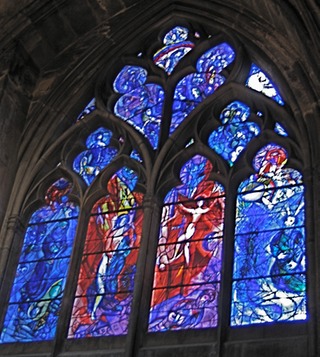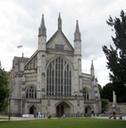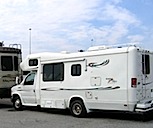Sometimes in this life we receive gifts that we don’t expect and can probably never repay. One such was the wonderful gift of hospitality we were given this past weekend. We had been been corresponding with a couple living in Germany who found our blog and are interested in doing what we are doing, but the other way around: in the US and possibly in a Born Free. They had invited us to stop by if we were ever in the neighborhood and offered irresistible extras: free unlimited use of their American-sized washer and dryer and the internet. Once we had decided to visit we also asked if they knew of a mechanic who could handle something Rover’s size. Skip, a retired US Air Force pilot, responded to the challenge and not only found a master mechanic but also purchased the oil filter and the brake fluid we might need.
So on Saturday Skip and his wife Marianne welcomed us into their home with genuine hospitality, took us to church on Sunday, fed us good German food, wine and beer, and talked travel, motorhomes, and lots of other things for hours. On Monday Rover had her oil changed and brakes checked and, because of a very heavy rain, even got a little bit of a bath. She cleared the mechanic’s garage door with a good 4 inches to spare.
While she was being serviced, Skip gave us a quick tour of the countryside on single lane back roads and hills we would never have attempted with Rover. One village had a 25% grade on part of the street through the town. (When we say “quick” tour, think AF pilot, narrow winding roads, and nimble car.) By the time we left on Tuesday after one more cup of good strong German coffee we were old friends. We have been invited back whenever we come through again and we hope to be able to return the favor in Minnesota some day. We are blessed.
We drove back into France to camp by the River Moselle in Metz, another city with a municipal campground just a few blocks from everything. Metz’s cathedral may have a higher ratio of glass-to-stone than anything else we’ve seen, and the windows, including some by modern artists like Marc Chagall, are spectacular.


We find it interesting that when things like windows and altars need to be replaced in these 800-year-old buildings, the new ones don’t try to look “period.” Metz is also home to a new art center, Centre Pompidou-Metz: it’s in the same spirit as the one in Paris, but even more outrageous. However, we were disappointed to discover that its opening is years behind schedule. Because of the campground’s great location, we hope to return to Metz when the art center has opened: perhaps it will be ready in 2010, although clearly it has quite a ways to go.
Metz’s campground did have two shortcomings, however: to get water flowing in the shower you have to keep pushing a button, and we were unable to take on any fresh water because none of the fittings would work with our hose. This is the first time this has happened in our nearly five months of touring in Europe. So today we purchased four different hose adaptors to ensure that won’t happen again.
We looked at the map and wanted to head downstream to Nancy, but there is no urban campground there, so instead we decided to stay another night in Metz and took a train to Nancy for the day. We had to wait longer for the train than it took to get there (about 35 minutes). Then we walked all over and took a mini train tour when we got tired of walking. Nancy’s claim to fame is its huge central square surrounded by seven very similar ornate stone 18th-century public buildings with six black and golden gates and one Arc de Triumph leading into (or out of) the square.

It is named after Stanislas, the beneficent leader who is responsible for nearly everything of value in the city, from hospitals, university, parks and old folks homes to schools and libraries. It is a beautiful, totally over the top space. Then we took the train back to Metz and a bus to the market near the campground.
Our next bit of sightseeing will take on a different form because we are now in Verdun (where our water hose fit without any attachments). This is the location of one of the longest and deadliest battles in WWI. The four-hour tour we are taking tomorrow will be in French, so we picked up some reading material. We have homework to do tonight. We don’t expect it will be pleasant.
